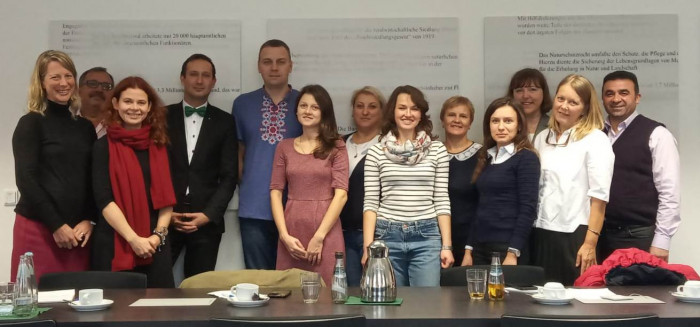
From 20 to 24 October 2019, the German-Ukrainian Cooperation in the field of Organic Agriculture (COA) organized a study tour for staff of the Ministry of Agrarian Policy and Food of Ukraine (MAPE) and sub-ordinated authorities. The main topic was the German experience of implementation of the EU organic legislation, specifically the set-up and surveillance of control bodies.
The first visit of the group – consisting of 8 participants from MAPE, the State Agency for Food Safety and Consumer Protection (FSA) and the control body Organic Standard – was to the Competent Authority of the State of Hamburg. Welcomed by Ms. Birgit Maus, Head of Department and her team, the participants were made familiar with the federal system in Germany and the share of responsibilities between the Federal Ministry of Food and Agriculture (BMEL) and the 16 competent authorities in the different Bundesländer.
The study tour next arrived to Göttingen, where the regional wholesaler Naturkost Elkershausen was on the program. Jonathan Mesecke, responsible for the purchase of vegetables and fruits, gave an interesting overview on logistics and marketing of organic products in Germany. Naturkost Elkershausen aims to ensure continuity of supply for its customers by signing long-term supply agreements with producers and manufacturers. He explained: “as pioneers of the organic sector in Germany we rely on these trustful relationships and our clients benefit from them”. Guided by the certification expert Dr. Jochen Neuendorf, the group could test their knowledge on correct labelling of organic food while visiting the warehouse facilities.
Dr. Neuendorff, CEO of the control body Gesellschaft für Resourcenschutz, GfRS welcomed the group next morning in their office facilities. He gave a comprehensive overview on the history and procedures of organic controls and certification in Germany and presented practical examples of the control bodies’ daily work, chances and challenges including the interaction between state authorities and private control bodies. The participants received additional information on Germany’s electronic database for organic producers, the database for organic seeds, controll procedures, qualification and training of inspectors, handling of violations and accreditation of control bodies. GfRS is also involved in the Anti Fraud Intiative, an information platform to support the integrity of organic products.
The given information was enriched by the professional input from Dr. Stefan Dreesmann from the Unit organic farming of the Lower Saxony Ministry of Food, Agriculture and Consumer Protection. Due to his involvement in the COA project as consultant for the harmonization of the Ukrainian Organic Law with the EU Organic Regulation, Mr. Dreesmann was able to give specific answers to questions of the Ukrainian authorities regarding their future task of surveillance of control bodies and the implementation of the law in general.
The Ukrainian delegation then visited the organic farm of the Dihlmann family in Iden, which is also certified by the private label Bioland. Next to an import company (Dihlmann Organic Trading, DOT), the family also manages an organic farm in Iwano-Frankivsk, Ukraine. Michael Dihlmann showed us around the premises and explained his organic production methods and its development within the past 25 years. He also pointed out advantages and challenges of organic farming in Ukraine, which was of special interest for the participants of MAPE. The tour ended with a rich Ukrainian lunch buffet.
The final destination of the study tour was Berlin, where the delegation was welcomed by Frank Rittner (Unit 624 Bilateral Projects) from the Federal Ministry for Food and Agriculture of Germany (BMEL). Ms. Beate Mahlberg (Unit 712 – Organic Agriculture) informed the participants about the BMEL “Organic Farming – Looking Forwards” strategy” which works towards greater sustainability in Germany and favours organic farming with its especially resource-efficient and environmentally compatible form of agriculture. The Federal Government thus supports efforts to expand organic farming in Germany and targets to have 20% of the agricultural land converted to organic farming by 2030.
Mr. Ali Öksüz from the Federal Agency for Agriculture and Food (Bundesanstalt für Landwirtschaft und Ernährung, BLE) then spoke about the organic control system in Germany. In addition to the legislation, he discussed the development of the control system and the minimum requirements for organic controls. Finally, he reported on his experience in surveilling control bodies. COA team leader pointed out the different levels of state surveillance tasks and put them into relation to the relevant institutions in Ukraine.
This study tour was an excellent opportunity for the participants to get to know the implementation of the EU organic legislation in Germany and thus to get a step closer to the successful implementation of the Organic Law in Ukraine.
For more information, please contact Stefanie Maak (Stefanie.Maak [at] afci.de)
